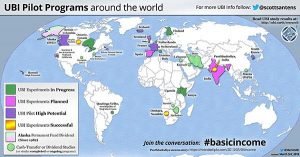The Rise of the Machines: automation in the workplace and the case for a Universal Basic Income. (Dr. Keith Hussein)
The current transfer of jobs from the physical to the virtual economy is a different sort of off-shoring, not to a foreign country but to a virtual one. If we follow recent history we can’t assume these jobs will be replaced either. – W. Brian Arthur
In March 2017 the consultancy firm Pricewaterhousecoopers produced a report claiming that over 10 million British workers and their jobs are potentially at serious risk of being replaced by robots in the next fifteen years. In effect, it means that 30% of jobs in Britain are under direct threat of replacement by robotic technology due to recent far-reaching advances in artificial intelligence (AI) designed specifically to replace workers.
While the report predicts that automation would boost productivity and create fresh job opportunities, it also claims that urgent action will be required to mitigate the effect of AI on the workplace of the future. The most prominent concerns are the impact this will have on present inequality and unemployment levels. PwC argues that 2.25 million jobs were at high risk in wholesale and retailing (the sector that employs most people in the UK) while 1.2 million were under threat in manufacturing, 1.1 million in administrative and support services and 950,000 in transport and storage.
Its Chief Economist John Hawksworth argues that: “A key driver of our industry-level estimates is the fact that manual and routine tasks are more susceptible to automation, while social skills are relatively less automatable.
That said, no industry is entirely immune from future advances in robotics and AI.’’ Jon Andrews, its Head of Technology and Investments also added: “There’s no doubt that AI and robotics will rebalance what jobs look like in the future, and that some are more susceptible than others. In the future, knowledge will be a commodity so we need to shift our thinking on how we skill and up-skill future generations’.
The debate currently taking place over automation resembles those which took place in relation to de-industrialisation and globalisation in the 1980s and 1990s. At that time it was conceded that the free movement of capital, corporations and labour would create ‘losers’ as well as ‘winners’ (to use the socially neutral parlance of neoliberal discourse) due to the knock-on effects on unemployment and the widening of inequality.

Education and funding Education is key.
The consensus of that time argued that as long as these ‘losers’ were adequately supported, either through re-skilling, education opportunities, or a stronger social safety net these changes would have minimal impact. However, as economist Mark Blyth argues instead in countries such as the UK (and US) educational budgets and welfare systems were drastically cut back. So the communities most affected by deindustrialisation in the North, Wales and Midlands never recovered their former prominence.
Trump and Brexit are clear warning signs that we can’t stop ignoring the social effects of technology on employment and wages.
Both Hawksworth and Andrews thus make highly salient points: the technological change of Amazon Go and driverless cars is happening fast and has massive economic, social and ethical ramifications. We have no other choice as a society but to confront the potential problems caused by automation in the workplace and come up with a viable solution. One idea which is typically mooted is the introduction of a Universal Basic Income (UBI) to mitigate these ramifications. So how would it work in practice?
UBI is a welfare programme in which all citizens receive an unconditional sum of money from the government. It would provide a safety net, address insecurities associated with workers not having full-time staff contracts, and help boost mobility in the labour market as people would have a source of income between jobs. It also streamlines the existing welfare system and its myriad of different benefits into one overall payment system.
The idea of UBI provided by the state is nothing new and stretches back at least to Thomas Moore’s classic Renaissance text Utopia (1516) where the Portuguese traveller Raphael Nonsenso states ‘Such a scheme would be a more astute way of fighting theft than sentencing thieves to death, which had the unpleasant side effect of increasing the murder rate’’.
It was also proposed by French revolutionary Antoine Caritat (1795) and developed further by his close friend the English radical Thomas Paine (1796) who proposed an Equal Basic Endowment to be paid to all adult citizens that would be accrued from the taxation of land and property. More recently, it was also proposed by monetarist economist Milton Friedman as a ‘Guaranteed Citizen’s Income’ as a means to end disincentives to work caused by ‘poverty’ and ‘unemployment traps’ of the US welfare system.
Trials have now begun in Finland, the Netherlands, Canada, Kenya, Uganda, Brazil, Spain, Italy, and even the US, with more trials in the works for Scotland and likely even India and more.

What is Universal Basic Income?
The benefits of a UBI are potentially immense if the scheme can be introduced properly.
It can help recipients do other work and reconsider old choices: It will enable them to retrain or undertake care responsibilities for loved ones, safe in the knowledge that they will have enough money to maintain a decent standard of living while they do. It will, therefore, help each of us to decide what it is we truly want to pursue as a career.
This brings into play a huge number of unpaid activities are currently not recognized as economic contributions in society. Yet, our economy increasingly relies on these free contributions such as the work performed by carers. A Basic Income would recognise and reward these (often unpaid) activities performed by families and friends. This is the most valuable work of all: In 2014 it was estimated that unpaid adult carers in the UK provided care worth £56.9 billion a year to the State (ONS, 2017). The introduction of UBI would end the extreme financial poverty typically experienced by those who give up work to look after a relative on a full-time basis.
The second key understanding is just how much non-universal, conditional welfare systems disincentive work. No one sees higher marginal tax rates than people on welfare - no one. As someone on welfare earns income, they lose their benefits. The result is the reality of people being barely better off accepting employment or even becoming far worse off. In effect, it would end the problem of poverty and unemployment traps built into the UK welfare system.
It doesn’t stop there though, because the provision of basic income has a multitude of repercussions beyond the elimination of fear, and these repercussions are themselves systemically transformative. Like any market, the labour market is at the mercy of economic supply and demand.
High unemployment drives wages down because the supply of labour, namely the amount of people competing for the same openings, is greater than the demand for labour. By removing their desperation for income, a UBI would give workers the ability to decline job opportunities with poor pay and working conditions, which would cause wages to rise beyond the beyond the level at which the income is set.
At present, before much of the switch to automation has occurred, an unhealthy rate of private household debt hinders consumption because it forces people to pay down debt interest with funds that would otherwise be spent on goods and services. This prevents the money multiplier from circulating around local economies through killing off domestic demand. By ensuring citizens have consumer spending power, a UBI helps to keep money flowing through the economy, particularly after tens of millions of jobs will have vanished through obsolesce. Wealth must be distributed more-or-less evenly throughout an economy for it to function smoothly and grow sustainably.
The rise of the machines and the fully automated workplace mean that it’s not long before another major economic disruption takes place. The market will embrace the new jolt in productivity because business interests have incentive and power to do so. We could simply continue our passive attitude to the increased unemployment this will lead to, or we could simply reassess our predicament from a more radical direction so that UBI becomes an integral part of the Fourth Industrial Revolution which is now upon us. In this sense, the automated workplace can give us the freedoms promised in Daniel Bell’s post-industrial ‘Leisure Society’ nearly 60 years ago. How could we possibly turn that down?
WHITE HEAT: The fourth Industrial Revolution
Support Independent Journalism Today
Our unwavering dedication is to provide you with unbiased news, diverse perspectives, and insightful opinions. We're on a mission to ensure that those in positions of power are held accountable for their actions, but we can't do it alone. Labour Heartlands is primarily funded by me, Paul Knaggs, and by the generous contributions of readers like you. Your donations keep us going and help us uphold the principles of independent journalism. Join us in our quest for truth, transparency, and accountability – donate today and be a part of our mission!
Like everyone else, we're facing challenges, and we need your help to stay online and continue providing crucial journalism. Every contribution, no matter how small, goes a long way in helping us thrive. By becoming one of our donors, you become a vital part of our mission to uncover the truth and uphold the values of democracy.
While we maintain our independence from political affiliations, we stand united against corruption, injustice, and the erosion of free speech, truth, and democracy. We believe in the power of accurate information in a democracy, and we consider facts non-negotiable.
Your support, no matter the amount, can make a significant impact. Together, we can make a difference and continue our journey toward a more informed and just society.
Thank you for supporting Labour Heartlands








